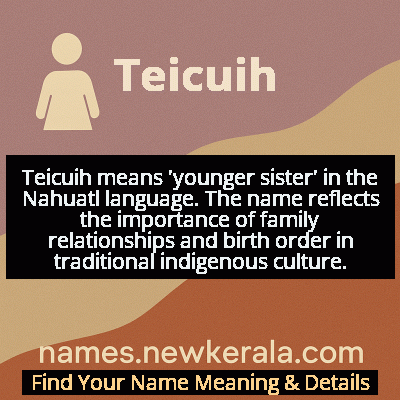Teicuih Name Meaning & Details
Origin, Popularity, Numerology Analysis & Name Meaning of Teicuih
Discover the origin, meaning, and cultural significance of the name TEICUIH. Delve into its historical roots and explore the lasting impact it has had on communities and traditions.
Name
Teicuih
Gender
Female
Origin
Nahuatl
Lucky Number
3
Meaning of the Name - Teicuih
Teicuih means 'younger sister' in the Nahuatl language. The name reflects the importance of family relationships and birth order in traditional indigenous culture.
Teicuih - Complete Numerology Analysis
Your Numerology Number
Based on Pythagorean Numerology System
Ruling Planet
Jupiter
Positive Nature
Optimistic, inspirational, and creative.
Negative Traits
Scattered, exaggerating.
Lucky Colours
Yellow, gold, purple.
Lucky Days
Thursday.
Lucky Stones
Yellow sapphire.
Harmony Numbers
1, 2, 9.
Best Suited Professions
Arts, writing, communication.
What People Like About You
Creativity, optimism.
Famous People Named Teicuih
Teicuih Tlazohtzin
Noblewoman and cultural preservationist
Documented pre-Columbian traditions and helped preserve Nahuatl language during early colonial period
Teicuih Xochitl
Poet and educator
Revitalized Nahuatl poetry and established language programs in rural Mexican communities
Teicuih Martinez
Anthropologist and activist
Founded indigenous rights organization focusing on cultural preservation and language revitalization
Name Variations & International Equivalents
Click on blue names to explore their detailed meanings. Gray names with will be available soon.
Cultural & Historical Significance
Historically, names like Teicuih were part of a complex naming system where children's names often reflected their birth order, family position, or circumstances of birth. This practice demonstrated the Nahua people's sophisticated understanding of social relationships and family dynamics. The name also connects to broader Mesoamerican cultural values that emphasize community interdependence, where each family member had clearly defined roles and responsibilities that contributed to the collective wellbeing. In contemporary indigenous movements, the name has taken on additional significance as a symbol of cultural resilience and the importance of preserving traditional knowledge systems through younger generations.
Extended Personality Analysis
Individuals named Teicuih are often perceived as nurturing, loyal, and deeply connected to their family and community roots. They typically exhibit strong protective instincts toward those they consider part of their extended family circle, embodying the traditional role of the younger sister who maintains family bonds and traditions. Their personality often combines youthful energy with a surprising maturity in emotional intelligence and interpersonal relationships, making them natural caregivers and confidantes.
Teicuihs are frequently described as adaptable and observant, having learned from childhood to navigate complex social dynamics within family structures. They tend to be excellent mediators and peacemakers, skilled at understanding different perspectives and finding common ground. While they may appear reserved initially, they possess inner strength and resilience, often serving as the emotional anchor in their social circles. Their combination of traditional values and modern adaptability makes them effective bridges between generations and cultures, able to honor heritage while embracing progress. This duality allows them to thrive in diverse environments while maintaining their core identity and values.
Modern Usage & Popularity
In contemporary times, Teicuih has experienced a modest revival among families seeking to reconnect with their indigenous heritage, particularly in Mexico and among diaspora communities in the United States. The name is most commonly used in regions with strong Nahua cultural presence, such as Puebla, Veracruz, and Guerrero, though it remains relatively rare compared to more mainstream Spanish names. Recent decades have seen increased usage as part of the broader indigenous rights movement and cultural revitalization efforts, with parents choosing the name to honor ancestral traditions and promote linguistic diversity. While not appearing on mainstream popularity charts, its usage reflects a growing appreciation for pre-Columbian names and represents a conscious choice to preserve cultural identity in an increasingly globalized world. Educational initiatives and digital platforms have also contributed to greater awareness and appreciation of traditional Nahuatl names like Teicuih.
Symbolic & Spiritual Meanings
Beyond its literal meaning of 'younger sister,' Teicuih symbolizes continuity, cultural transmission, and the enduring strength of family bonds across generations. The name represents the idea that each generation stands on the shoulders of the previous ones, with younger siblings carrying forward traditions, knowledge, and values while adding their own contemporary interpretations. Symbolically, it embodies the concept of renewal and the cyclical nature of family and community life, where youth represents both the future and the preservation of the past. In metaphorical terms, Teicuih signifies the bridge between tradition and innovation, honoring ancestral ways while adapting to contemporary realities, and represents the vital role that younger family members play in ensuring cultural survival and evolution through changing times and circumstances.

